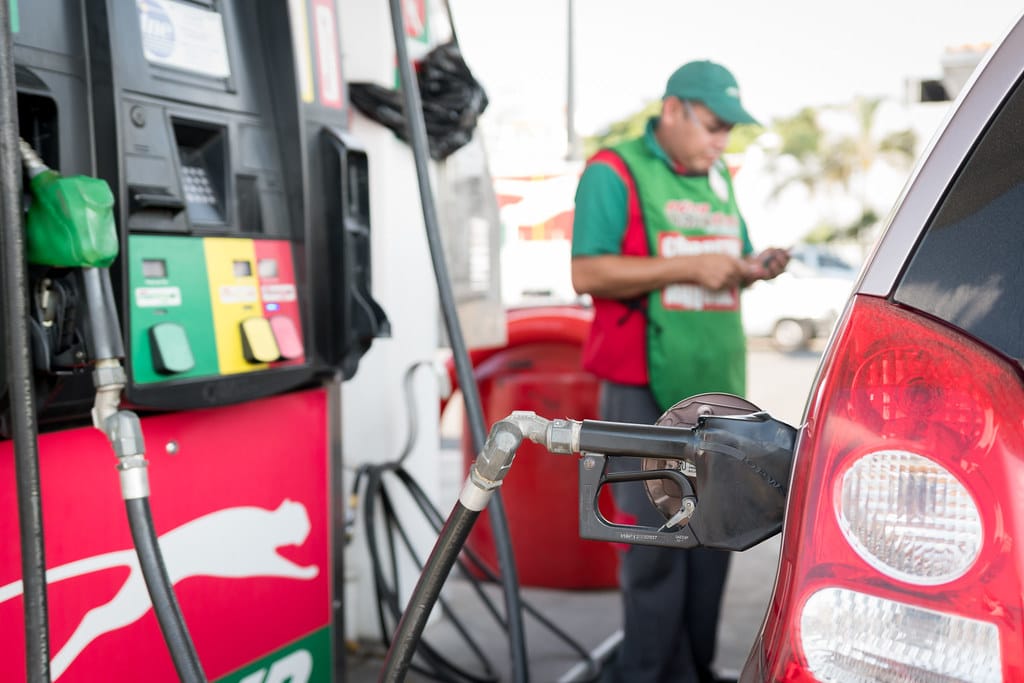In the second week of the unfreezing of fuel prices, ordered by the Government of Daniel Ortega, prices will suffer a sharp rise this Sunday that will impact the pockets of Nicaraguans, confirmed sources in the oil sector.
Super gasoline will rise 0.54 córdobas per liter, regular 0.46 córdobas and diesel will increase 0.62 córdobas.
Daniel Ortega’s regime kept the prices of oil derivatives frozen for more than two months, when the international value of crude oil fell by almost 20 dollars per barrel.
This decrease, according to hydrocarbon experts, did not translate into a reduction in national fuel prices, which in Nicaragua are not regulated by the State and are set freely, every week, by the oil companies. And on the contrary, they have now thawed prices when oil shows an upward trend, which is to the detriment of Nicaraguans.
Prices in an upward trend
The rise in super gasoline this Sunday will be 2.08 córdobas per gallon, regular will rise 1.75 córdobas, and diesel will rise 2.36 córdobas.
With this increase, a liter of super gasoline, in Managua, will cost 42.02 cordobas. Until this Saturday it is priced at 41.48 cordobas. While regular gasoline will go from 40.61 to 41.07 cordobas per liter.
Diesel, the most consumed fuel in the country, will go from costing 36.94 córdobas per liter to 37.56 córdobas.
These average prices correspond to the service stations in Managua, since in the other departments and regions of the country the cost of transportation and distribution, as well as other expenses, must be added.
Ortega blocked casualties
The freeze, which was effective as of October 22, 2021, was applied to the prices of super and regular gasoline, diesel, kerosene, and liquefied petroleum gas (LPG) —popularly known as “gas for cooking” —, which is the only product regulated by the Nicaraguan Institute of Energy (INE).
The government’s decision came two weeks before the general elections in which Ortega, without political competition, gave himself his third re-election consecutive for a fourth term in a row, and second with his wife, Rosario Murillo, as vice president.
The regime froze prices when the intermediate oil of Texas (WTI), of reference for Nicaragua, was quoted at 84.53 dollars per barrel. According to the Government, “to protect the economy and the lives of families, the President of the Republic (Daniel Ortega) has decided not to apply the constant increases, derived from the movement of international oil prices.”
However, after the freeze, the value of crude oil fell, reaching 65.44 dollars per barrel at the beginning of December.
“The freezing did not bring benefits because, in those two months that the prices were frozen at the local level, the prices of oil and its derivatives at the international level experienced a decrease of 9.4% in November, and 12% in December, compared to October. 2021”, detailed engineer Patricia Rodríguez, specialist in energy issues.
“(Consumers) lost because the decrease at the international level would have caused a decrease at the local level, even if it was to a lesser extent because they never decrease in percentages equal to those that occur at the international level,” commented the specialist.
They freeze with high prices and “release” at times of increases
Rubén Ernesto Arriola, an expert on consumer issues, lamented that consumers did not benefit during the “freeze”, since fuel prices were “high” when they were “fixed”.
With the decision of the regime, the average price of super gasoline was frozen at 42.02 cordobas per liter; that of regular gasoline at 40.90 cordobas per liter; and that of diesel —the fuel with the highest consumption at the national level— at 36.52 cordobas per liter.
Both experts highlighted that the Ortega regime unblocked fuel prices, when in the international arena oil shows an upward trend. Such a situation is detrimental to consumers, who will pay the increases.
“Now that prices are unfreezing, oil and its derivatives are rising. In January 2022, an increase of 11% is being experienced compared to December 2021”, Rodríguez explained.
Between November, December and early January 2022, the international price of oil remained below 80 dollars per barrel, and fluctuated between 70 dollars.
Last weekend, when fuel prices were unfrozen, WTI oil was trading at $81.97 per barrel. This Friday, January 21, the price of crude oil closed at 85.14 dollars on the New York Mercantile Exchange, after a bullish streak that has placed its prices at maximums not seen since 2014.

















